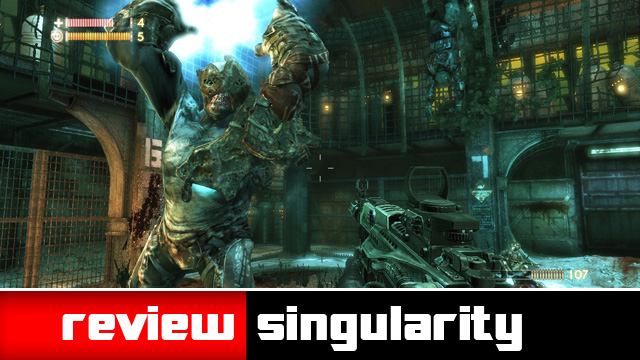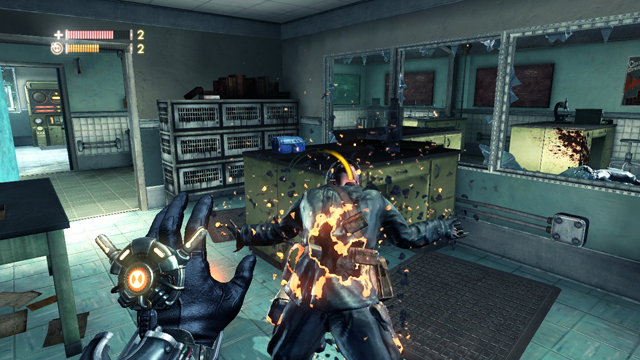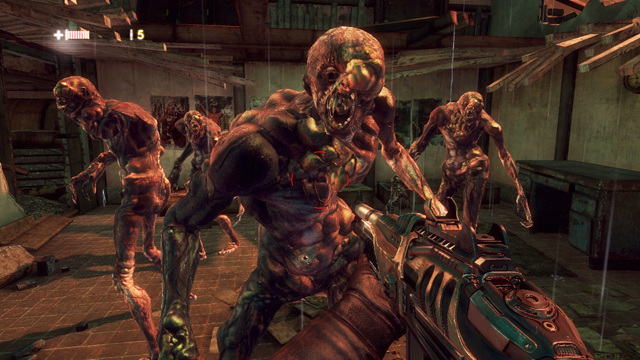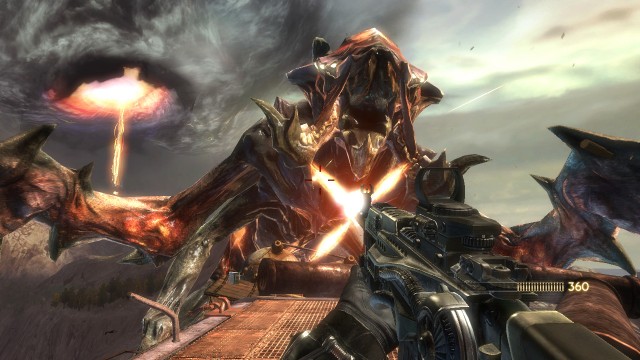
I had a sort of dilemma when planning my review of Singularity. On one hand, it is pretty clear in what genre this game wants to be classified in — the hybrid FPS/RPG style of BioShock, for example — but it could never be as fresh or groundbreaking. On the other, it is the middle of a scorching summer filled with late-night work weeks, and I’ve wanted nothing more than escapism to make me forget about the projects that have been haunting me.
To try and review Singularity from the standpoint of its artistic significance and how it fits in against similar games wouldn’t do it (or my experience with it) any justice. The game isn’t special; it’s hardly spectacular. In fact, had Singularity been released at any other point in the already jam-packed gaming year, it might be reviewed with much poorly in comparison to the high profile properties surrounding it.
But it wasn’t released in the Spring, and it isn’t going to be released in the Fall. It was released during the aforementioned Summer when it was the only game of it’s type, much like Red Faction was last year. And for that reason, for the need to play a game and forget about the automotive industry that I work in, Singularity is the perfect getaway.
There may not be a lot to “love” about Singularity, but there is a lot to “like”. Like Jennifer Aniston in Office Space, the game manages just barely enough flair to keep us employed in its story and mechanic: a Russian calamity unleashes a shifting timeline, and it’s up to US agents to utilize time-bending tools to resolve it.
Time travel? Check. Changing the past affects events in modern time? Check. Cool weapons that relate to time travel? Check. It’s not new, but add in shades of BioShock Lite and it works.
The game clocks in at about 8 hours, follows a fairly linear path of moving room-to-room, and uses the linearity to emphasize the fast-paced (and surprisingly entertaining) story. It’s impossible to get lost or not know what the next goal is, which makes it kind of a mindless experience resulting in a lot of room-clearing and weapons du jour. This also allows the game to employ situational experiences such as: escaping a sinking freighter, fighting a giant boss on a collapsing train, and time-shifting objects to exit a room. It never seems like the mechanics are repeated either, so it’s almost as if each section of the game is disconnected from the previous.

The multiplayer portion of the game is designed much in the same way, going beyond the standard “kill or be killed” to include a massive variety of weapons based on the choice between human or mutant. The humans can manage healing, guns, and teleportation; while the mutants can control the minds of opponents, vomit acid, or multiply. It’s a lot like playing the Zerg in StarCraft, except much more sadistic.
Singularity really excels at some of its physical design. The weapons are all enjoyable and are varied enough (almost like MegaMan weapons) to feel different. I found myself gravitating towards the time-based sniper rifle, which allows its bullets to be slowed and controlled, but anyone who plays the game for long enough will find their own favorite weapon. Everything can be upgraded — armor, weapons, tools — which provides that RPG flavor: time effects last longer, bullets are more explosive, etc.

The only thing that remains a mainstay throughout the game is the TMD (Time Manipulation Device), a device that allows the user to modify time in a few different ways. The device can shift boxes and items forwards and backwards in time, allowing a collapsed box to become whole again to wedge open a gate or aging humans and enemies into extinction. The TMD is also used to power up reactors and open holes in space-time, but these are specific situations.
The TMD provides, but it doesn’t quite deliver on the promise of what we saw of the game at E3 last year (where entire buildings were brought down and enemies were converted back into humans). The potential to really push the idea of altering time is there — especially in some of the environmental puzzles — but remains unrealized. But what is there is just enough to keep the game entertaining and provides a good base for what may end up being the beginning of a franchise.

Singularity has everything that a fun Summer flick has: explosions, plot twists, speedy action, and more explosions. It’s a diversion from the big guns hitting in the fall. Singularity doesn’t try to be the greatest game ever, so it makes up for it by being highly entertaining at an optimal 8-hour length. It’s fitting, then, that it all comes down to the game’s release window. Singularity isn’t perfect by any means, but it’s perfect for the Summer.
This review was based on a copy of the game provided by Activision. The single-player campaign was completed in Normal difficulty. The multi-player campaign was played across all modes. All images and video provided by Activision.


2 Comments